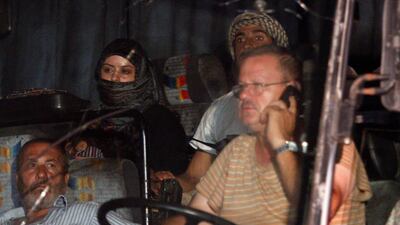A convoy of buses carrying ISIL fighters and their families stuck in Syrian government territory split into two on Sunday as they searched for a route to an ISIL-held city near the Syrian-Iraqi border.
The 17 buses, carrying about 600 people, began crossing Syria a week ago after ISIL fighters surrendered to Hizbollah and Syrian government troops in an area near the Lebanon border.
The convoy was halted on Wednesday near Al Sukhna, on the border of Homs and Deir Ezzor provinces, after the US military bombed roads between Al Sukhna and the city of Albu Kamal, the convoy's destination.
Both the US military and the Iraqi government have criticised the agreement that was struck with ISIL, saying the fighters were likely to move from Syria to Iraq. ISIL controls an area around Albu Kamal that straddles the Syrian-Iraqi border.
The US military has been monitoring the convoy, which also has an escort from Hizbollah, since it set off last Monday.
On Sunday, the convoy separated into two parts, with 11 remaining near Al Sukhna and the others travelling south toward the city of Palmyra.
It was not immediately clear why the convoy had split. Col Ryan Dillon, a spokesman for the US-led coalition fighting ISIL in Iraq and Syria, said both parts of the convoy were believed to hold a mix of fighters and civilians, and that for now, the US had stopped monitoring the part of the convoy that had moved south.
He denied accusations by Hizbollah that the US had prevented aid from reaching the buses.
“There have been deliveries and we have allowed that, but if there are armed fighters or elements moving toward the convoys, we would strike them,” Col Dillon said, adding that the US continued to monitor the part of the convoy that had remained near Al Sukhna and that the coalition continued to attack vehicles carrying ISIL fighters trying to reach the convoy.
“We are still watching the convoy in the north, and since the 29th of August we have struck about 85 ISIL fighters,” Col Dillon said. This agreement “was not something we were party to, not something that we were expecting, but it has been lucrative to the coalition to be able to strike so many ISIS vehicles”, he said.
Col Dillon said ISIL fighters trying to leave the convoy had also been targeted. “We have and we did strike elements who were separated and far enough away,” he said.
The surrender and negotiations followed eight days of fighting that trapped about 300 ISIL fighters between the Lebanese army and Hizbollah and Syrian government forces.
The negotiations led to the handing over of bodies of Hizbollah and Iranian fighters held by ISIL, as well as information about the location of the bodies of nine Lebanese soldiers who had been held by ISIL since 2014 and were presumably killed by the group. Those bodies have been exhumed by the Lebanese military and are undergoing DNA testing to verify their identities.
_______________
Read more:
You don't beat ISIL by dumping them somewhere else, US tells Syria and Russia
Is there ever an appropriate occasion to negotiate with terror groups?
_______________
Hizbollah has criticised US interference in the deal.
“The US goal of blocking the convoy has no relation with confronting ISIL,” its media office said on Saturday, though it did not posit what the actual reason may have been.
In central Syria, government media and groups that monitor the conflict reported heavy clashes between government troops and ISIL in Hama province, where the group still maintains a presence near the country’s main highway that links Damascus and Aleppo.
The Syrian Observatory for Human Rights reported that more than 100 ISIL fighters and more than 30 Syrian government troops and militia had been killed in fighting near the city of Salamiyeh since Saturday morning.
One website that monitors ISIL media accounts also reported on Saturday that the extremist militants claimed to have killed seven Russian soldiers in the area. Russia is also providing air support of the Syrian government’s effort against ISIL in the area.
Last month’s agreement with ISIL was not the first in Syria’s six-year-old civil war. It has been widely reported that the Syrian government reached an arrangement with ISIL to allow oil and gas to reach government-held areas after the group seized oil and gas installations in eastern Syria in 2013. In May, the US-backed Syrian Democratic Forces allowed ISIL fighters to withdraw from the Tabqa dam near Raqqa.
Col Dillon said the Tabqa deal, although brokered without the input of the US, had been a reasonable and pragmatic decision.
"When people look at Tabqa, the remaining holdout fighters were mainly in the dam, which was rigged to blow up,” he said. “The fallout would have been far worse than allowing them to withdraw. We were not party to that agreement, but the coalition did similarly strike individual fighters who were separated from their families.”
Larger deals have been struck between the Syrian government and other rebel groups, particularly since 2014. A source in Syria familiar with those negotiations said it was unlikely the problems with this deal would affect further negotiations, except for those with ISIL.
